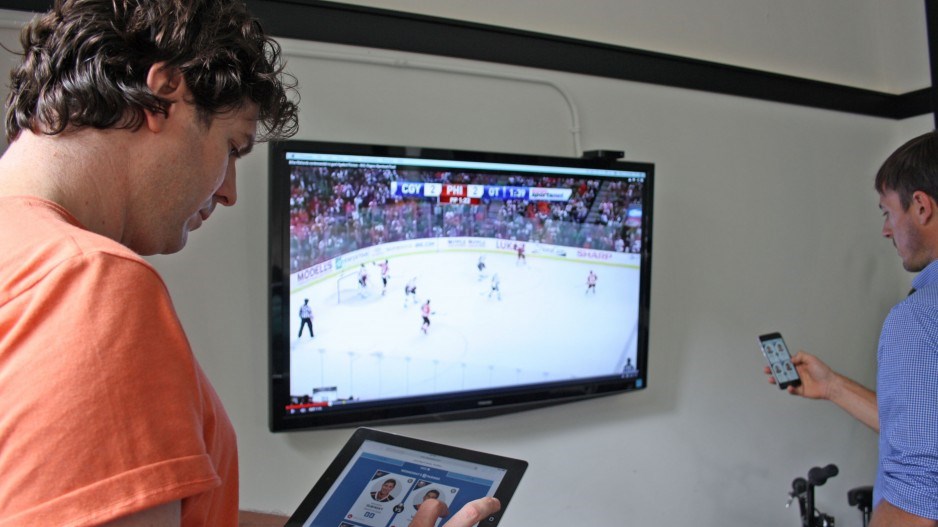Jamie Garratt is paying his employees to watch Hockey Night in Canada this upcoming NHL season.
Over the past six months, the president of Vancouver-based Idea Rebel has been working with Rogers Communications (TSX:RCI) to develop an interactive app for hockey fans.
Garratt said it wasn’t tough finding staff at the digital marketing agency to manage the Pick ‘N Play app, which responds to action on the ice as it happens, each Saturday once the NHL season kicks off October 8.
“Hockey is such a huge part of Canadian culture and to be part of a large digital experience that’s tied to the broadcast, that’s huge for us,” he said, adding the app launches October 6.
“This will be the first [app] of its kind, obviously, in Canada.”
Instead of just sitting back and watching the Vancouver Canucks play the Edmonton Oilers on Hockey Night in Canada, fans pick players from opposing teams to go head-to-head in the week leading up to the game.
As those Saturday games air on TV screens at sports bars, viewers can check their phones to see how many points (and possible prizes) they earned depending on how their players do.
After Rogers signed a $5.2 billion deal last fall to secure TV and Internet rights for the NHL, Garratt said the media giant was eager to get fans engaged with the new network.
“Most people are using devices as a second screen when watching TV anyway,” said Claudio Afonso, Idea Rebel’s creative director.
“[Rogers] can get them locked in as fans by creating a really simple game.”
Efforts to pull hockey fans into the second-screen experience aren’t unique to Idea Rebel.
Vancouver-based app developer Atimi Software partnered with NHL teams such as the Canucks and Chicago Blackhawks to provide fans with custom features geared toward their respective markets.
Its sports framework – the basis for its other team apps – has 3.3 million downloads and about 50,000 active monthly users.
“[NHL teams] found fans in other places that they didn’t know and that allowed their market to go after that,” said Scott Michaels, Atimi’s executive vice-president.
Partnerships with NHL teams ended earlier this year when the league pushed all 30 franchises to start using its own app. But Atimi is still in the local sports game and has created an app for the B.C. Lions.
“It’s news on the team, it’s real-time scores, it’s photos published by the team and any information that the team wants [to] let out. And of course the social side, so that fans can comment in the app and about everything that’s happening with the Lions,” Michaels said.
He said the apps also function when the season is over: “For example, draft information or what the team does in the off-season around their charities.”
In terms of making it a business success, Michaels said the key has always been securing involvement of team sponsors to make sure fans are don’t have to pay for that second-screen experience.
And although NHL apps are no longer in the works at Atimi, Michaels said the company is now eyeing U.S. markets that are big on college and high school teams.
But these second-screen experiences also aren’t limited to sports or TV.
Vancouver’s Work At Play specializes in creating services for gamers that stretch beyond when the playing systems are turned off.
“We keep [gamers] engaged when they’re not on the console, in between play time,” said Anja Haman, Work At Play chief operating officer. “We do that by creating experiences and applications across multiple devices – consoles, desktops, mobile, tablets.”
This could be anything from a mobile app that breaks down player statistics to a game-within-a-game app that furthers a player’s status in the main console game.
Haman said both social media and the changing video game market have pushed Vancouver tech companies toward developing second-screen experiences.
“A lot of small startups have surfaced and you don’t know who’s doing what,” she said.
“Instead of just being large console titles being released on a two-year cycle, it’s become much more online [driven].”




